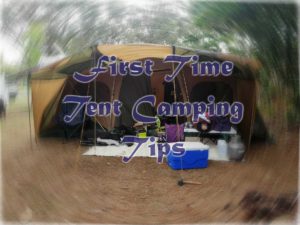 So you’ve decided to see what all the fuss is about camping, but are in dire need of first time tent camping tips. Don’t worry, this page will get you all set, packed and ready to go.
So you’ve decided to see what all the fuss is about camping, but are in dire need of first time tent camping tips. Don’t worry, this page will get you all set, packed and ready to go.
With many camping years experience under our belts, my family and I have had many ups and of course a few downs during our experiences. This is all part of the experience.
With every camping trip, you learn something new. Something you can improve on, or perhaps something that is best left until you’re a more experienced camper. These are the tips you will pick up along the way through your own camping experiences.
But to help make the transition all that much easier, and enjoyable, I have complied a list of the best tent camping tips for the first timers. Many of these tips have been touched on before in previous articles. So make sure you click on the relevant links which will take you by the hand and explain the tips in greater detail.
For those looking for what to take camping, be sure to check out the first timer camping checklist.
Camping For Dummies
Beginners Guide To Camping
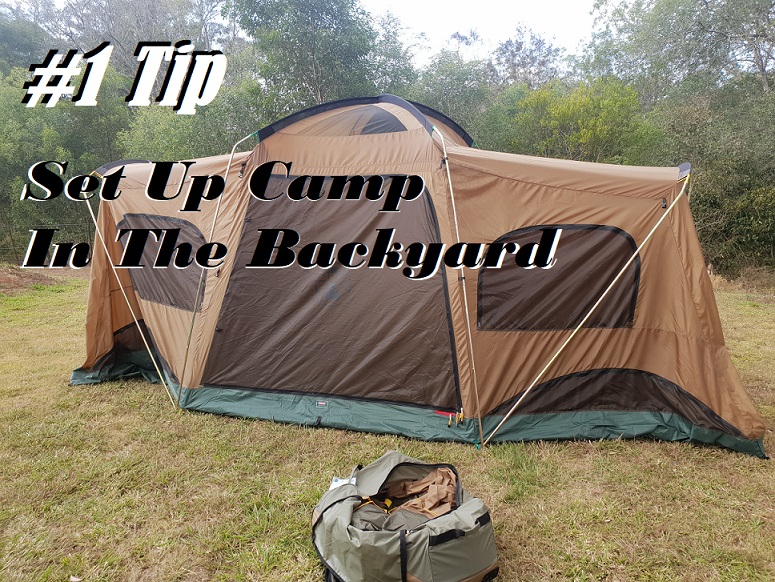
#1 Tent Camping Tip: Practice At Home
As silly as this may sound, you really should set up camp in your own backyard. If you live in an apartment, try one of your relatives or friends house whom have a empty patch of grass spare for the night.
There’s a number of reasons why you should always set up camp in your backyard first before taking on the wilderness. Unless you have an instant tent, assembly can become quite the headache. But if you don’t, you should certainly practice at home first.
1. Ensuring Your Equipment Works
The last thing you want to do is head out all pumped up for your first time tent camping only to discover your tent poles are broken. Or your rain-fly has a huge hole in it just asking for weather to turn sour and drop a bucket load or two of rain into your tent.
But the tent is only one piece of camping equipment you should test out. Set up your camping airbed or camp cot as well. In fact spend the whole night experiencing what its like to live outdoors away from modern appliances and power.
The last thing you want is to discover once its too late that your air mattress has a gaping big hole in it. Or that your battery powered lanterns are low on battery power, if not broken. Every piece of camping equipment should be tested before you get on the road.
2. Kid Friendly Experience
Another reason to set up camp in your backyard first is to give your kids a taste of what lays ahead. Most kids will be over the moon with the thought of camping, but you would be surprised at how many freak out once it comes time to going to bed out in the wilderness.
If you’re not prepared for this, your first night camping could be a sleepless one. Ways to help condition your kids for the transition into tent camping include: Bringing their favorite pillow, blanket or bed teddy so that they feel a sense of home when they are sleeping in a new place.
3. Ensuring You’re 100% Ready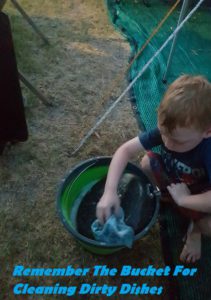
While it tests out your kids ability to sleep outside of the home, it will also test your capabilities as well. For the most part, adults are much easier to settle once it comes to bed time.
But being 100% ready for your first time camping also means that you have included every item needed to survive the trip. By practicing in your backyard first, you will quickly realize whether you have forgotten to pack your medication, toothpaste, tomato sauce, first aid kit, map. All the common things even experienced campers manage to forget.
If you are taking the kids, you will need a separate kids camping checklist. Not only is it hard enough to remember to bring everything you need, but when you’re taking a car full of kids, the mission is that much greater. By practicing your first night outdoors in your own backyard will prove to be the best tent camping tip for beginners.
4. Ensure Your Tent Is Big Enough
All to often people make the mistake of thinking that a tent labelled as a 6 person tent will actually be big enough for 6 people. While technically you can squish in like sardines, its not comfortable for anyone.
To help you out, I’ve gone ahead and chosen a number of tents that are suitable for a family. For a family of 5, these tents here are ideal. When you’ve got an extra person coming, you’re going to look at a tent capable of handling 6 campers comfortably. These tents here are my recommendations.
Tips To Waterproof Your Tent
What many first time campers don’t realize is that a tents waterproofing capabilities are only as good as the maintenance provided to the tent. Every 12 months or so, your typical nylon tent will need an additional coating of waterproof spray.
Without this ongoing maintenance, the waterproof barrier will break down from expose to UV rays and general wear and tear. Applying waterproof spray is simply, quick and relatively cheap. So don’t neglect this crucial tip if you want to stay dry next camping season.
It’s also best to apply waterproof spray to a brand new tent also. Not everybody is aware that not all tents are waterproof from the get go. Even tents with the waterproof badge, should have an additional coating of spray to better protect the inside of your tent. I always spray my tents when they are brand new. It takes no time and is quite affordable for the peace of mind in the event a random rain patch heads your way.
Camping Location Tips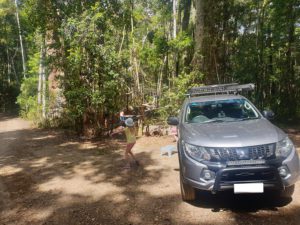
With the rapid rise in popularity for rooftop tents, camping these days can head in any direction. Through the harshest of environments to the most scenic landscapes at your front door. But for first time campers, its best to stick to the beaten track.
Don’t go off road to a remote location on your first camping trip. Unless you are thoroughly prepared with maps, GPS, solar power, survival gear etc. For most first time tent campers, car camping is the easiest and most harmless way to get into the great outdoors.
These tips on car camping will provide you with all the adequate information you need to make you first time camping a blazing success. It’s honestly the best way to get into this outdoor adventure for your very first time.
Arrive On Site Early
It’s not easy pitching a tent in the dark, so make sure you allow yourself a good hour or two before sun sets to set up camp. This will give you enough time to set up the tent and un pack all your belongings.
Avoid setting up in the middle of the day on a stinking hot summers day. The levels of frustration and impatience rise while you are wiping sweat out of your eyes while the sun’s glare is beating down on you.
Tip To Prolong Life Of Your Tent
While I have already gone over waterproofing your tent, there’s another key element to protecting the life of your tent. That is setting up on a stone and twig free environment.
The best way to do this is to use a tarp or tent footprint. Having a thick layer of protection under your tent is essential to stopping small twigs and rocks from penetrating the waterproof base of your tent.
If you don’t have a tent footprint and a rock makes a hole or two in your tent, even though its under the tent you can still obtain water damage. If it rains, water will seep under the tents base and will essentially start coming up through the floor where the hole is.
This is also why its important the tarp you have under the tent is slightly smaller than the tents base. Otherwise water can pool up around the edges of the tent eventually seeping in though seams or any little holes under the tent. Here are some additional tips to camping in wet weather.
Tips For Camping On The Beach For The First Time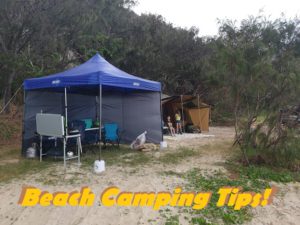
Once you have tackled car camping, a very popular step up is to go beach camping. I love camping on the beach, its truly amazing and I highly recommend it to anyone wanting to explore the wonders of this world.
However, beach camping comes with risks, for both you and your vehicle. First of all, you will most likely need a high clearance 4WD to be able to tackle the soft sands.
Don’t be fooled into thinking you can push your 2WD sedan through the soft sand you need to enter on to get onto the beach. No matter how fast you go, chances are you will get bogged and will need a 4WD beach recovery tow truck to rescue you. Embarrassing and especially not cheap.
If you do have or hire a 4WD for the beach, ensure it has under-body rust protection. Or at the very least never drive through ocean water. Rust will start eating away at your vehicle almost instantly.
Various First Time Beach Camping Tips
Beach camping is slightly different to regular camping and special attention needs to be paid to certain aspects. Once you have your vehicle sorted, here are a few of the key elements to consider when camping on the beach .
- Bring lots of drinkable water. Don’t underestimate how much water you and your family needs. There’s no fresh water on the beach, so you must bring it with you by the gallon. Don’t forget water for cleaning dishes and your portable showers.
- Anticipate strong ocean winds. Set up your tent with shelter from the strong ocean breeze, or you will regret it. Even if you don’t lose your tent, the amount of noise and annoyance it can cause will drive you bonkers.
- This tip is a must, use sand pegs to hold down your tent and awnings. Regular tent pegs simply don’t stay in the sand. The slightest breeze and they will pop out of the sand. Never compromise on sand pegs.
- Obtain beach and vehicle permits before you get on the beach or you can expect some hefty fines making you wish you stayed in a hotel.
- Be cautious of tide times. The tide can swell up and quickly ruin anyone’s camping experience. Make sure you tent is parked well back from existing tide lines so you don’t run the risk of being swept out to sea.
- Drive 2 to 3 hours on either side of low tide. This will ensure you have enough firm sand to drive on and not risk the chance of being taken in by sea water at high tide. Also follow traditional road rules on the beach. Indicate to oncoming traffic to let them know what side of their car you are going to be on when you both pass.
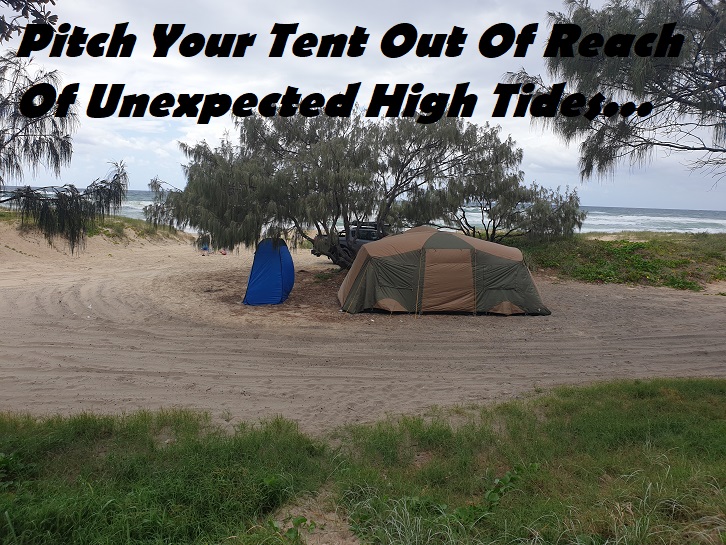
Tip For Positioning Tent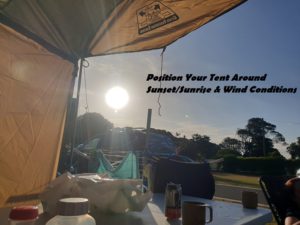
By now you should have at least set your tent up in the backyard once. So now you know the basics to setting your tent up. The next important tip to understand is the position your tent is facing.
Take note of the wind direction and also where the sun sets and rises. While sometimes you may not have a choice which way you tent is positioned due to small camping spots, or restricted access, choosing the right position will make your camping experience all that much better.
If its the dead of summer and the sun is absolutely smashing you, setting your tent up facing away from sunset is ideal. This will give you shelter at the front of your tent from the skin melting temperatures as the sun goes down. The sun being behind your tent will allow the awning or tent porch to provide greater shade than if if it was directly facing the sun.
But during the colder months, you will want the front of you tent facing sunset so you can achieve maximum afternoon warmth. Providing comfort and light as you prepare dinner.
Positioning When Car Camping
Another small but valuable tip is in regards to camping in a holiday park, or even national park. Places people car camp often have big street lights to keep the site lit up at night.
I made the mistake of facing our tent directly at one of these street lights. Needless to say, the tent was as bright at night as it was in the day. Making sleep near impossible.
Ways to avoid this could include moving your site to a location further away from the light when possible. Alternatively position your tent so the back faces the street light. This way you can stick up a blanket or towel over the back of the tent to block out a fair bit of light. By doing this you’re not blocking the front entry and disrupting the tents awning if applicable.
Be Mindful Of Animals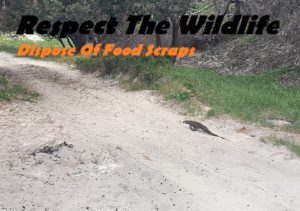
When your camping outdoors, you’re no longer in your territory, your in wild animal territory. I’m not saying this to scare you off camping, but so you can act accordingly. Even when car camping you run the risk of being face to face with a wild dog for example.
To minimize contact with wild animals you need to keep your camp site clean and tidy. Whether you are camping on the beach, in a national park or on private property, food scarps attract animals.
Scout the camp site for provided bins or find a safe place away from your tent to store your rubbish until you leave. Always take your rubbish with you.
Leave The Site In Better Condition Than You Found It
While most people are mindful of their rubbish, many often don’t stop to consider the idea of improving the experience for the next camper and the environment. Do your part to help. If you see some rubbish that is not yours, do the right thing and take it with you to dispose of appropriately. Make the place you camped in better than how it was before you got there. If we all do a little bit each, camping will be better in the long run.
Campfires & Firewood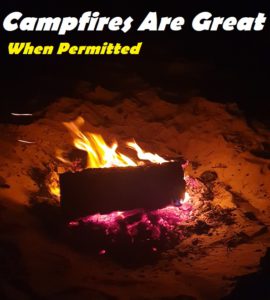
Sitting around the campfire is one of the best ways to enjoy the camping life, its something we all dream of. But did you know that some camping sites, fire are prohibited. Don’t just assume your safe to start a campfire or might end up with a heating bill you never expected.
Always seek out permission first by either contacting the holiday park, national park office or relevant authorities. Also check for local fire bans in the area. When camping on the beach, dig a hole in the sand to set up a fire, this will help it keep contained and gives the next camper in line somewhere to set up their campfire.
Collecting logs for the fire, whether you’re using a chainsaw for camping or a axe is also prohibited in many national parks. However some do leave fallen trees scattered for use of campers. Its pivotal you seek advice from your local national park before ever attempting to cut down a tree.
Safety First Camping Tips For Dummies
Many first time campers neglect the safety risks that camping can impose. If taking your kids for the first time, its essential you are armed with these child safety camping tips before you head out the door.
While escaping the day to day life to go camping can be the best thing for your mind and soul, injuring yourself or others due to neglecting safety matters can prove costly. Some basic campsite safety tips can include the following:
1. Tripping Hazards.
Another reason it’s good to set up your campsite in the day is so that you can identify potential tripping hazards. The most frequent trip zone occurs outside the tent where the guys lines tie your tent to the ground.
Children are prone to tripping over them and so are adults. They are unavoidable. To better protect yourself, use this tip: Attach glow in the dark strips to the guy lines or use glow in the dark pegs. This will make the guy lines more visible at night when most tripping occurs due to poor lighting.
2. Never Cook Inside Your Tent
The fumes gas powered cooking appliances commonly used for camping can be deadly. Never ever cook inside an enclosed tent which doesn’t have a fume outlet.
While its not uncommon to use a tent stove inside your tent in the Winter months, its imperative that the tent has a stove jack. This will allow the potentially deadly fumes to exit your tent before you breathe them in.
If you have the space, set up a separate gazebo or awning and use this as the cooking area. You can attach side walls so that the area is semi enclosed and cut off from rain and wind. While also keeping it far away from young children.
3. Bring A First Aid Kit
One of the most forgotten pieces of camping equipment is the first aid kit. Its worth bring 2 sets of first aid kits, one for the car and the other for the campsite. Whether its a fall from a sand dune or a bite from an animal, a first aid kid is one of the most important tips and first time camper can remember.
4. Protect Yourself Against Insects
There are many ways to mosquito proof your camp site and its essential to do so if you anticipate these annoying insects. If you are remote camping and don’t come fully equipped, this can be a serious issue. Especially if you or one of your kids are allergic to sand flies or mosquitoes. Not to mention the diseases they can carry.
Respect Your Neighbors
Most holiday parks and camp sites will have a specified noise cut off time. This means no music, parties yelling etc. Respect your fellow campers and keep the noise down after this designated time. You just never know who is camping beside you and how angry they may get when your loud antics wake up their young child. Any parent knows how hard it can be to get their child to sleep.
On the other end of the spectrum, control your kids volume. As hard as this is, its advisable to make sure your kids are asleep before the noise cut off time. Also try to ensure your kids know where your campsite boundaries are to restrict them from entering another campers zone.
Tips For Returning Home From A Successful Camping Trip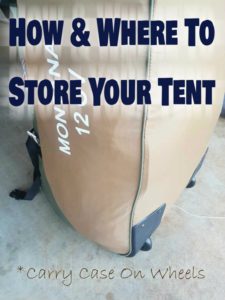
For a first time camper, the above tips will go a long way to ensuring you have a safe and wonderful camping experience. But the party isn’t over the minute you pack up your camp site.
This tip is probably the most annoying of them all, but equally important. Once you arrive home safely, you need to store your tent correctly. Unless you had a horrible time and don’t care that your tent may rot, get moldy and covered in mildew. Storing your tent correctly will go a long way to ensuring the lifespan of your tents material.
But it’s not just the tent you need to store, anything else that’s sandy, dirty, been in contact with water is at risk. When I return home from a camping trip, I hose down and clean my car for a start.
Next comes all the gear: air mattresses, sleeping bags, cooking equipment etc etc. It all has to be cleaned and ready to go for the next episode. Hanging deflated air mattress out to air them out will help ensure there’s no moisture to cause mold.
I hope you have found this guide to first time camping tips useful and informative. If there’s any more tips you would like to add, feel free to drop a comment below.

Stella
Sunday 30th of June 2019
It is good to go out of our environment sometimes and explore another atmosphere. There is nothing more fulfilling than that. The greatest fun is deriving pick pleasure from the camping activities. Camping can be so annoying if necessary needs are not put into places. That is why the first time camper should practice camping at the backyard of their home as you've suggested before they finally go out for camping. Taking all our needs is very important for interesting experience, that is why we need to get prepared a week before the set-off. Taking straight forward route and getting to the camp on the day time is very important in order to put things in right places. This is a very excellent reviews that can provide good help for many people planning for first time camping. Safety is very important and should be the top most priority.
admin
Sunday 30th of June 2019
I agree Stella, allow yourself one week in advance to start preparing and learning as much as you can about the location in which you plan to go camping. As well as ensuring you have all the gear needed and that it works.
Pentrental
Sunday 30th of June 2019
Wow great insights for beginner campers. Your experience with camping is really invaluable and I appreciate you writing this post. Definitely there is something new to learn with each camping trip. Some things can go right and some things can go wrong. Excellent #1 tip. It's best practice to try out a new tent especially in the backyard as it will not only give you a chance to see the tent components it will give you an idea of how long set up will take. Waterproofing is critical as well, and trying it out in the back yard during a rainstorm might be a good idea too. Something I haven't yet done is camp on the beach, so you have me really intrigued here. I'll keep your post handy for when it's time to give it a try, thank you and great post!
admin
Sunday 30th of June 2019
Yes that's a good idea, if you anticipate rain, set up the tent in your backyard and test its waterproof capabilities. Better to be safe than sorry. Camping on the beach is the best thing you can do. I'm sure you'll fall in love with it.
Sondra M
Sunday 30th of June 2019
This guide is great! It contains a lot of really useful tips and information. I've got a fair amount of experience camping, so I can tell you know what you are talking about.
However, even though I've camped a lot, I've never camped by the ocean on a beach before. You brought up some issues that I would have never thought of.
I will thank you even more when I do finally get to go camping along a beach. Hopefully I will be able to do so later this summer.
admin
Sunday 30th of June 2019
Hi Sondra, you really do need to experience beach camping. There's nothing like it. Going to sleep to the sound of the ocean on your footstep and waking up to the sound of waves crashing. Very relaxing. Ensuring you have a vehicle suitable for the beach is an absolute must. I saw a 2WD attempt driving on the sand once. Wasn't long before the beach recovery tow truck was there to pull them out.
Dave Sweney
Sunday 30th of June 2019
This is a super useful guide for first-time tent campers that can be used by anyone. I read through the post from top to bottom, and one more time again, as there were things I missed the first time through it. I am a tent camper and have been for years.
Unless you have something like this post and guide to help you when first starting out with this kind of adventure, the lessons will be harder to deal with as you will live through them...It can seem simple to just buy a tent and head to the woods or the beach...
That is not the case, however. There are a ton of things to think about, and you want everyone to have a good time versus memories of a nightmare, so prior planning and preparation is a must. I like that you have prepared the guide in the before, during, and after style.
The new to camping adventurer can look at each phase of a camping trip and take the steps you advise to be ready to have a fun and safe time. Even as an experienced camper (I started tent camping as a young lad and have carried through to this day this hobby) I picked up a couple of tips. Thanks and also thanks for putting this together. A lot of new to tent camping families are going to be able to use this!
admin
Sunday 30th of June 2019
Thanks for your kind words Dave. I think we never stop learning and evolving with every camping trip. That's the beauty of camping, you can chop and change it up as much as you like. But learning and preparation are key to doing it for the first time. Camping can certainly to into a nightmare as you stated if you're not well prepared.